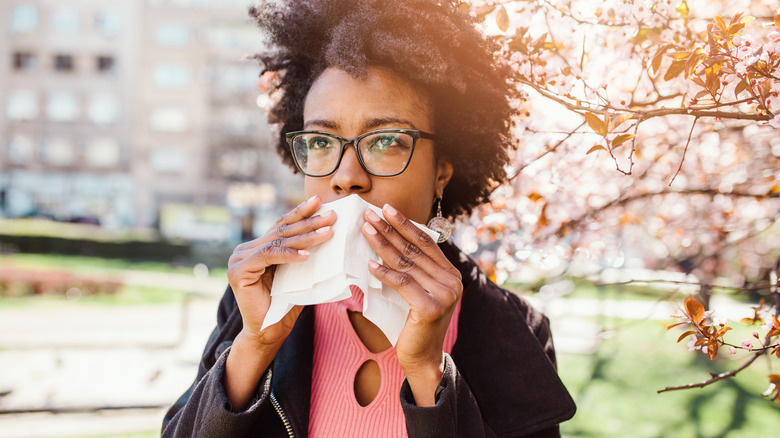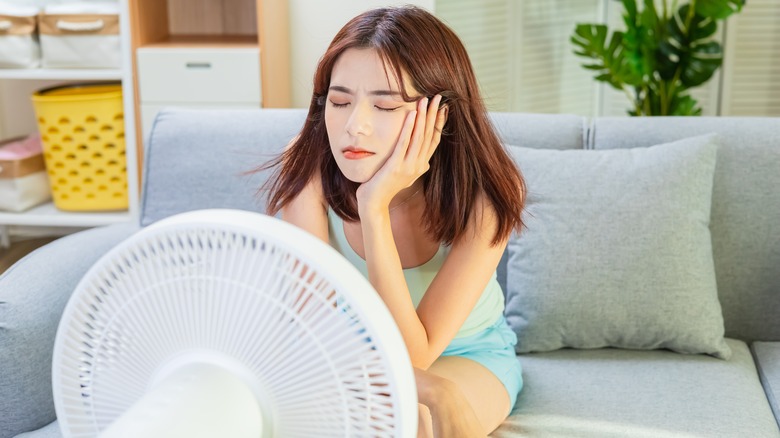Are Seasonal Allergies Affecting Your Mental Health? SAD For Summer Is All Too Real
Lana Del Rey was right. Summertime sadness is all too real. Seasonal affective disorder, or SAD is rather common, affecting around 4% to 6% of the American population. It usually happens in the wintertime when nights are longer and the sun is rarely out. The American Psychiatric Association notes that people with SAD feel anxious and lethargic during this time, barely having any interest in engaging in their hobbies. A milder, and much more prevalent version of SAD is usually referred to as the "winter blues," when a larger part of the population feels listless in the colder months. Interestingly, 10% of people with SAD experience it in the summertime, when everyone is enjoying warmer weather and making the most out of the longer days.
There's still very little research surrounding summertime depression, but experts posit that it may be due to the changes brought about by a shift in seasons, including a disruption in routine and an uncomfortable climate. Allergies also apparently play a part, with a growing body of evidence suggesting that in the warmer months, when pollen is heavily present in the environment and people start sneezing and wheezing, many also report a drastic change in their mood. Allergies, as it turns out, can trigger depression in some people.
The link between allergies and seasonal depression
Having allergies is inconvenient enough as it is, but research shows that it's also linked to depression, although it may still be early to conclude that allergies cause depression. But it's still worth noting that a 2017 study published in Current Treatment Options in Allergy found that there's a link between allergies and depression and suicidal thoughts. Dr. Paul Marshall, a neuropsychologist at Hennepin County Medical Center, explained to CNN that when a person's allergy is at its peak, they usually experience symptoms that are also associated with depression, including lethargy and fatigue. "It's important for people to understand that experiencing allergies can affect their mood," he said.
Meanwhile, Dr. Naomi Torres-Mackie, a clinical psychologist, told Buzzfeed News that allergy symptoms can also severely damper one's mood. "The physical body and the connection to mood is strong," she noted. "Pollen leads to inflammation in the body, and that inflammation can impact your mood negatively." Inflammation can also affect the body's nervous system, which means it can interfere with not only your emotions, but sleep, memory, and even cognitive function.
Coping with summertime sadness
Whether or not your summertime sadness is caused by allergies or SAD, the first step to combating it is getting to the bottom of what triggers your mood changes. "Spend a little time identifying how the change in environmental factors has affected your well-being," psychologist Dr. Sherry Benton, told Real Simple. "What were you doing when you felt better [that] you're not doing now?" When you have a clearer understanding of your triggers, you will be better equipped in formulating a plan to address them.
If it just so happens that you find your depressive symptoms coincide with your allergies, you may want to lessen your exposure to your allergens, and of course, find other ways to treat your allergic reactions. If your trusty inhaler or antihistamines don't do the trick, you can also discuss with your doctor the possibility of going on steroids and getting allergy shots. It also goes without saying that you must avoid allergy flare-ups as much as you can, and that means wearing a mask, keeping the air at home clean, and avoiding outdoor activities when pollen counts are high.
If your depressive symptoms get a little too much to bear, always remember that you can get professional help. Professionals like therapists and counselors can give you the tools and resources to help make you feel better and assist you in keeping your overall mental well-being in check.
If you or someone you know needs help with mental health, please contact the Crisis Text Line by texting HOME to 741741, call the National Alliance on Mental Illness helpline at 1-800-950-NAMI (6264), or visit the National Institute of Mental Health website.


